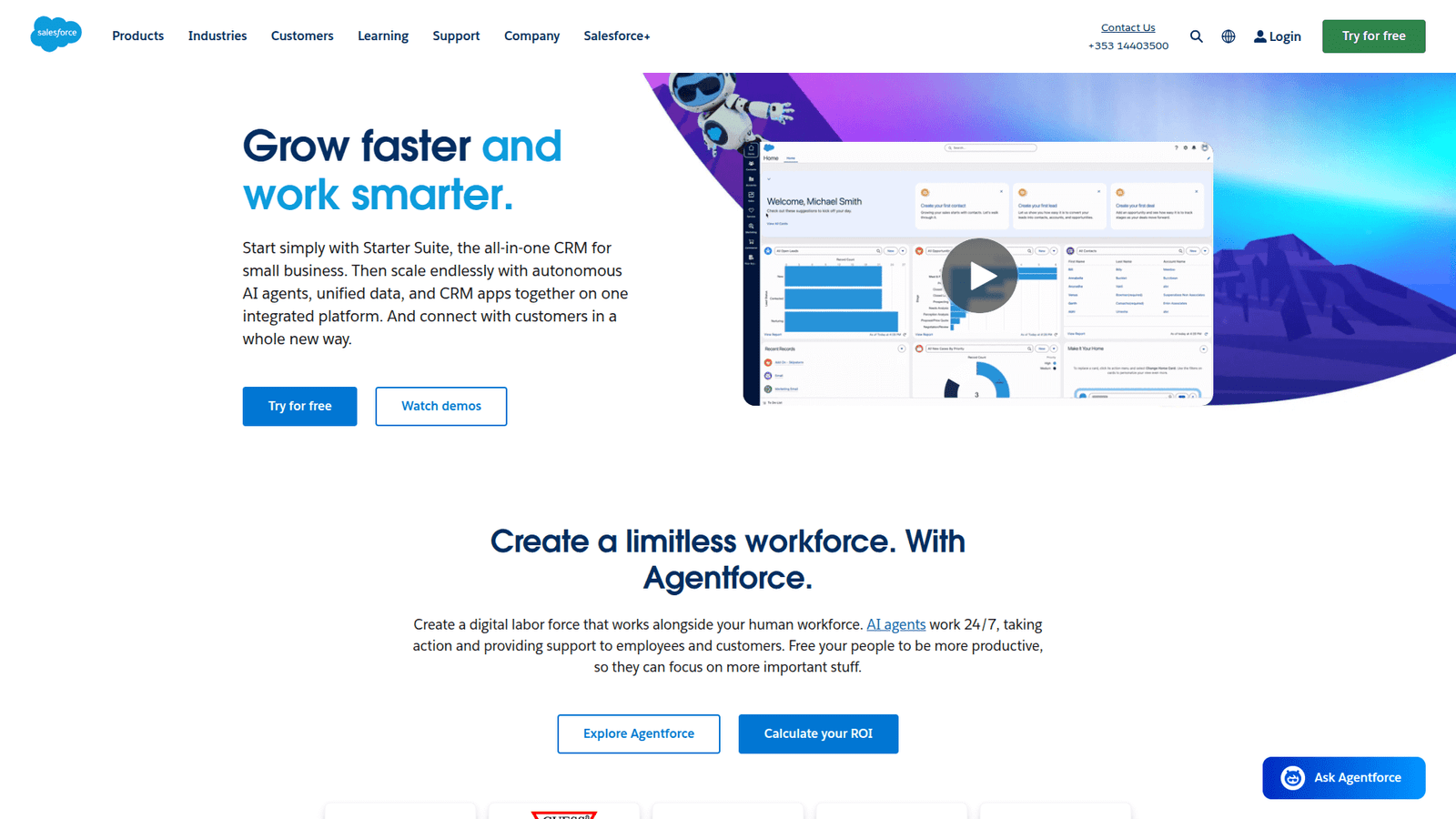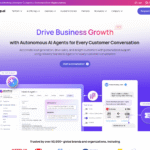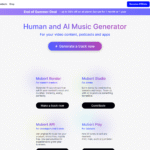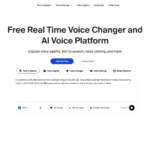Salesforce Einstein powers CRM Integrated AI Support. Boost efficiency, slash costs, and improve customer satisfaction fast. Stop guessing, start growing. Learn how now!
Why Salesforce Einstein Is a Game-Changer in CRM Integrated AI Support
Let’s be real.
Running Chatbots and Customer Support these days is tough.
Customers want answers yesterday.
They want them personalized.
They want them on whatever channel they’re using right now.
And your team?
They’re swamped.
Dealing with repetitive questions.
Hunting through mountains of data.
Trying to keep up with the sheer volume.
AI is everywhere, right?
You see it popping up in every corner of business.
Especially in customer-facing roles.
But are you using it where it counts most?
Like, deeply integrated into your customer relationship management system?
That’s where the real magic happens.
That’s where Salesforce Einstein comes in.
It’s not just another shiny AI tool.
It’s built into the platform you might already live in.
Salesforce.
And it’s designed to tackle the exact problems you face every single day in support.
We’re talking smarter chatbots.
Predictive insights.
Agents who feel like they have superpowers.
Less busywork.
More actual problem-solving.
If you’re serious about making your support function a competitive advantage…
Not just a cost center…
Then ignoring CRM Integrated AI Support is like bringing a knife to a gunfight.
This article is about exactly that.
How Salesforce Einstein isn’t just hype.
How it changes the game for support teams.
And how you can use it to build a support operation that scales, delights, and actually contributes to your bottom line.
Ready?
Let’s get into it.
Table of Contents
- What is Salesforce Einstein?
- Key Features of Salesforce Einstein for CRM Integrated AI Support
- Benefits of Using Salesforce Einstein for Chatbots and Customer Support
- Pricing & Plans
- Hands-On Experience / Use Cases
- Who Should Use Salesforce Einstein?
- How to Make Money Using Salesforce Einstein
- Limitations and Considerations
- Final Thoughts
- Frequently Asked Questions
What is Salesforce Einstein?
Okay, first things first.
What exactly are we talking about here?
Salesforce Einstein is Salesforce’s AI technology.
Think of it as the intelligence layer built into the entire Salesforce Customer 360 platform.
It’s not a separate product you buy and try to duct-tape onto your existing systems.
It lives inside Salesforce.
Right where your customer data lives.
That’s the key differentiator.
It uses machine learning, natural language processing, predictive analytics, and more.
All powered by the massive amounts of data flowing through your Salesforce instance.
It’s designed to make every Salesforce user smarter and more productive.
From sales reps trying to find the next best lead…
To marketers trying to personalize campaigns…
To service agents trying to resolve cases faster.
For our purposes here, we’re focused on its power in Chatbots and Customer Support.
It’s about bringing AI directly into the service agent console, into the chatbot conversations, into the reporting that helps you understand your customers better.
It predicts outcomes.
It automates tasks.
It provides insights nobody could spot manually.
It helps understand customer sentiment.
It recommends next best actions.
It routes cases intelligently.
It powers those slick chatbots that handle common queries without needing a human.
Basically, it takes all the rich customer data sitting in your CRM…
And turns it into actionable intelligence that makes your support operations run smoother, faster, and more effectively.
It’s AI that works within your existing support workflow.
Not against it.
Key Features of Salesforce Einstein for CRM Integrated AI Support
Alright, so it’s Salesforce’s AI layer.
But what does that actually look like on the ground?
What can it DO for your support team?
Here are some of the standout features focused on CRM Integrated AI Support:
- Einstein Bots:
This is probably the most visible feature for customers.
These are AI-powered chatbots you can deploy on your website, in messaging apps, or even within the Salesforce mobile app.
They handle common questions, gather information, and even perform simple tasks like checking order status or updating contact details.
Crucially, they are deeply connected to your CRM data.
This means the bot knows who the customer is (if they’re logged in or identified), what their past interactions were, and what their case history looks like.
No more starting from scratch.
If the bot can’t resolve the issue, it seamlessly hands the conversation over to a human agent.
And it provides the agent with the full transcript and all the collected customer data.
This saves agents time and makes for a much better customer experience.
- Einstein Article Recommendations:
Agents spend a huge chunk of their time searching for the right information.
Knowledge base articles, FAQs, internal documentation.
Einstein watches the customer’s query or the case details.
It then proactively suggests relevant knowledge articles to the agent.
Based on past successful resolutions, case context, and keywords.
This isn’t just a simple keyword search.
It uses natural language processing to understand the intent behind the query.
It dramatically reduces search time for agents.
It helps ensure consistent answers.
And it speeds up resolution times.
Less clicking around, more helping customers.
- Einstein Case Classification & Routing:
Getting cases to the right agent quickly is critical.
Einstein can automatically analyze incoming cases.
It looks at the subject line, description, and other details.
Then it predicts key fields like priority, product type, and routing queue.
This prediction gets smarter over time as it learns from how agents classify and close cases.
This automates a manual task for agents and managers.
It ensures cases land with the agent best equipped to handle them.
Faster routing means faster time-to-response.
Which makes customers happier.
- Einstein Reply Recommendations:
Imagine having suggested responses pop up as you’re typing a reply to a customer.
That’s what this feature does.
It analyzes the customer’s message and the conversation history.
Based on past successful replies and common answers, it suggests snippets of text or full canned responses.
Agents can use these suggestions as a starting point.
They can edit them or send them as is.
This speeds up response time.
It ensures consistency in messaging.
And it reduces the mental load on agents, especially for common issues.
- Einstein Supervisor:
Managers need visibility into team performance and customer satisfaction.
Einstein Supervisor provides real-time insights.
It monitors queues and agent workload.
It can detect anomalies, like a sudden spike in a certain type of case.
It can even analyze conversation sentiment to flag potentially unhappy customers who might need immediate attention.
This helps supervisors manage their teams more effectively.
It allows them to jump on issues before they escalate.
And it provides data to make better staffing and process decisions.
These aren’t separate systems.
They are features within the Salesforce Service Cloud platform.
Working together.
Powered by the same underlying AI and customer data.
That’s what makes the “CRM Integrated” part so powerful.
Benefits of Using Salesforce Einstein for Chatbots and Customer Support

Okay, the features sound cool.
But what’s the payoff?
Why should you care about putting Salesforce Einstein to work in your Chatbots and Customer Support operations?
It boils down to some big wins:
Faster Resolution Times:
This is massive.
Bots handle initial contacts.
Agents get suggested articles and replies.
Cases are routed correctly from the start.
All of this means customers get their issues fixed faster.
Simple.
Improved Agent Productivity:
Einstein takes the grunt work off your agents’ plates.
Less searching.
Less typing repetitive answers.
Less manual classification.
This frees up agents to focus on complex issues.
The ones that actually require human empathy and problem-solving.
They can handle more cases.
They can handle them better.
Enhanced Customer Satisfaction:
Happy customers come back.
Fast, accurate, personalized support makes customers happy.
Bots provide instant answers 24/7.
Agents have the right info at their fingertips.
The experience feels connected because it’s all tied to their CRM profile.
This leads to higher CSAT scores and happier customers.
Lower Support Costs:
Deflecting common issues to bots saves significant money.
Each interaction a bot handles costs pennies compared to a human agent.
Increased agent productivity means you can handle more volume with the same team size.
Or even potentially reduce staffing needs for basic queries.
Einstein helps optimize resource allocation.
Better Data and Insights:
Einstein isn’t just about doing things faster.
It’s also about understanding what’s happening.
It analyzes conversation data, case trends, and sentiment.
This provides valuable insights into customer pain points.
What are the most common issues?
Which articles are most helpful?
Which agents are most effective?
This data helps you improve your products, your support processes, and your knowledge base.
Consistency and Accuracy:
Bots and suggested replies pull from approved knowledge.
This ensures customers get consistent, accurate information every time.
Reduces the risk of agents giving conflicting answers.
Or missing key details.
Look, this isn’t about replacing humans with robots.
It’s about giving humans better tools.
It’s about making the support operation smarter.
More efficient.
More human, paradoxically, by automating the stuff that isn’t.
Pricing & Plans
Alright, let’s talk brass tacks.
What does this cost?
Salesforce pricing can be… complex.
Einstein isn’t typically a single add-on price.
It’s often bundled into different editions of Salesforce Service Cloud or available as specific add-ons depending on the exact features you need.
Think of it like different levels of AI power.
Some basic Einstein features might be included in higher-tier Service Cloud editions (like Enterprise or Unlimited).
More advanced features, like full Einstein Bots capabilities or specific predictive analytics, might require additional licenses or specific Einstein add-on packs.
For example, Einstein Bots often require an add-on license that’s priced based on the number of bot conversations or sessions you handle.
Einstein Article Recommendations or Reply Recommendations might be tied to Service Cloud licenses or specific Einstein for Service add-ons.
There isn’t a widely advertised “free plan” that includes significant Einstein capabilities for service.
Basic Salesforce trials might give you a glimpse, but serious usage requires a paid Service Cloud subscription, potentially with extra Einstein features.
Premium versions and bundles often include:
More AI prediction types.
Higher limits on bot conversations.
Access to more sophisticated dashboards and analytics.
Predictive capabilities beyond basic case classification.
Comparing it to alternatives is tricky.
Most other dedicated AI chatbot or knowledge management tools would need to be integrated separately with your CRM.
That integration itself adds cost and complexity.
Einstein’s main value proposition here is its native integration within Salesforce.
So while a standalone bot might seem cheaper upfront, you need to factor in the cost of getting it to talk effectively with your CRM data.
My honest advice on pricing?
You NEED to talk to a Salesforce rep.
They can tailor a package based on your specific use case, the volume of support interactions, and the specific Einstein features you want to deploy for CRM Integrated AI Support.
Don’t rely on general online pricing guides.
They won’t give you the full picture for your situation.
Hands-On Experience / Use Cases
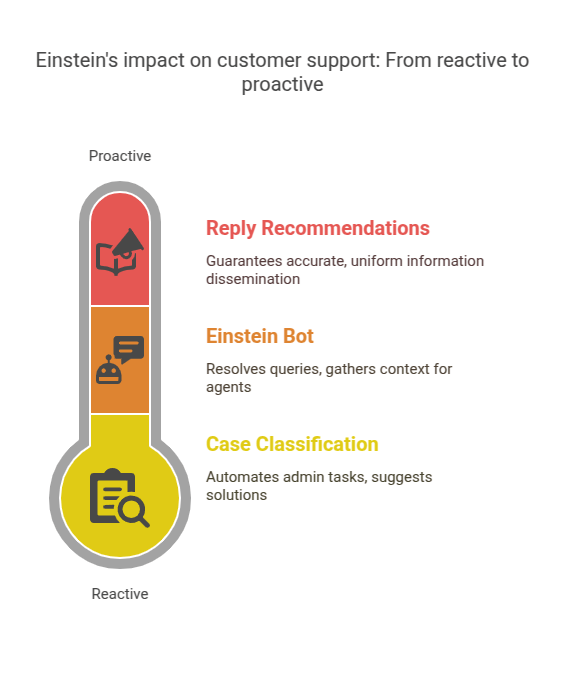
Okay, theory is one thing.
What about putting this stuff to work?
How does it actually look when you’re using Salesforce Einstein for Chatbots and Customer Support?
Let’s walk through a few scenarios.
Use Case 1: The Overloaded Agent Inbox
Imagine a service agent, Sarah.
Her queue is filling up with emails and web-to-case submissions.
Before Einstein, she’d open each one.
Read it.
Figure out what product it’s about.
Decide if it’s high priority.
Maybe assign it a sub-reason code.
Then start looking for an answer in the knowledge base.
With Einstein Case Classification, many of these steps are automated.
When a new case comes in, Einstein analyzes the text.
It auto-populates fields like ‘Product Type’ (e.g., “Billing”, “Login Issue”, “Feature Request”).
It suggests a ‘Priority’ based on keywords or customer history.
It might even suggest the best ‘Routing Queue’.
Sarah opens the case, and half the admin work is already done.
Then, Einstein Article Recommendations pop up in the sidebar.
“Hey Sarah, this looks like it’s about resetting a password. Here’s the ‘How to Reset Your Password’ article.”
Sarah clicks the article, copies the steps or links to it in her reply.
Boom.
Resolution time slashed.
Sarah feels less stressed.
She moves onto the next case faster.
Use Case 2: The Common Customer Question
Think about the questions you get asked constantly.
“What’s my order status?”
“How do I update my credit card?”
“What are your opening hours?”
These are prime candidates for an Einstein Bot.
A customer lands on your website.
The chatbot pops up.
“Hi! How can I help you today?”
Customer types: “Where is my order?”
The bot recognizes the intent.
Because it’s integrated with the CRM, it might ask for their order number or email.
It looks up the order status directly from Salesforce.
“Your order #12345 is out for delivery today!”
Resolved.
No human agent involved.
If the question is more complex (“I want to change the delivery address”), the bot can gather the order number, verify the customer, and then transfer the chat to a human agent, providing all that context upfront.
The human agent doesn’t have to ask the same questions again.
Seamless handoff.
Use Case 3: Ensuring Consistent Messaging
You just updated your refund policy.
Agents need to use the new wording.
Before Einstein Reply Recommendations, you’d email everyone the new text.
Hope they save it somewhere.
Hope they remember to use it.
With Einstein, the approved, updated reply template is available.
When a customer asks about refunds, Einstein suggests the correct, pre-written reply.
The agent just clicks to insert it.
Or uses it as a base.
Everyone is giving the same, accurate information.
Consistency is high.
Training time for new policies is reduced.
In my experience, the usability is good *within* the Salesforce environment.
If you’re already a Salesforce user, Einstein feels like a natural extension.
It doesn’t require a separate login or interface for agents.
The results? Measurable improvements in key support metrics.
Lower average handling time (AHT).
Higher first contact resolution (FCR).
Improved customer satisfaction scores.
And perhaps most importantly, less burnout for the support team.
They spend less time on mundane tasks and more time solving interesting problems.
Who Should Use Salesforce Einstein?
Alright, who actually benefits from this?
Salesforce Einstein for CRM Integrated AI Support isn’t for everyone.
If you’re a one-person show handling 5 customer emails a day, you probably don’t need it.
But if you’re serious about support and already on Salesforce, it’s worth looking at.
Here are some ideal candidates:
Businesses using Salesforce Service Cloud:
This is the most obvious one.
If you’re already using Salesforce for your customer service operations, adding Einstein is a natural progression.
The AI works best when it has access to your existing CRM data, cases, and knowledge base.
The integration is seamless.
Companies with increasing support volume:
Growth is great, until your support team is drowning.
Einstein helps you scale your support operation without proportionally scaling your headcount.
Bots handle the surge of simple queries.
AI assists agents to handle more complex ones faster.
Organisations focused on customer satisfaction:
Want to move the needle on CSAT or Net Promoter Score (NPS)?
Faster, more accurate, and more personalized support is key.
Einstein helps deliver that.
Predictive sentiment analysis can even flag at-risk customers.
Support teams dealing with repetitive questions:
If your agents spend a significant portion of their day answering the same 10-20 questions, Einstein Bots are a game-changer.
Automate the mundane.
Let humans handle the unique challenges.
Businesses that value efficiency and cost savings:
Time saved is money saved.
Reducing average handling time.
Increasing first contact resolution.
Deflecting cases to bots.
These all contribute directly to lowering the cost of providing support.
Managers who need better visibility:
Einstein Supervisor gives real-time performance data.
Spotting trends, bottlenecks, and potential issues becomes much easier.
This helps in resource planning and process improvement.
Companies with large knowledge bases:
A huge knowledge base is useless if agents can’t find the right article quickly.
Einstein Article Recommendations solve this problem.
Making your existing knowledge assets more effective.
Basically, if you’re a Salesforce Service Cloud user and support is a critical part of your business… AND you’re feeling the pain of volume, agent workload, or customer expectations… Einstein is likely built for you.
It’s about leveraging the data you already have in Salesforce to make your support smarter and more effective.
How to Make Money Using Salesforce Einstein
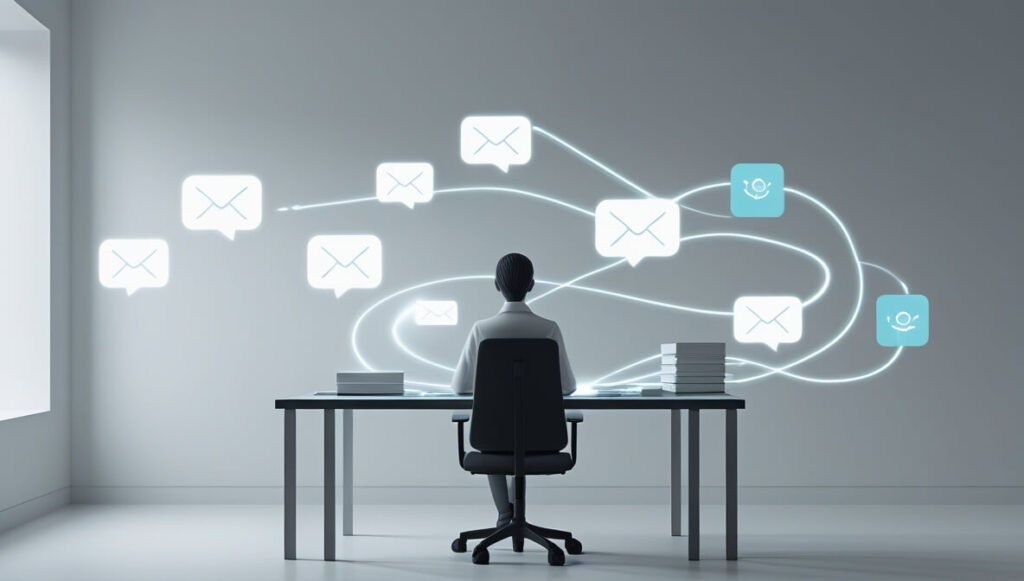
Okay, let’s flip the script.
If you’re a consultant, agency, or just someone looking for new ways to add value, how can you use Salesforce Einstein to make money?
It’s not about the tool making money FOR you automatically.
It’s about using the tool to provide valuable services.
Or to run your own business more profitably.
Here are some ideas:
- Offer Salesforce Einstein Implementation Services:
Many companies own Salesforce but don’t have the expertise to set up and configure advanced features like Einstein Bots, Case Classification, or Reply Recommendations.
You can specialize in this.
Help businesses analyse their support processes.
Design and build their Einstein Bots.
Train their AI models for classification and recommendations.
Integrate Einstein features into their existing Service Cloud console.
This requires deep knowledge of Salesforce Service Cloud and Einstein capabilities.
But the demand is growing as businesses look to leverage AI.
This is a high-value consulting service.
- Develop and Optimise Knowledge Bases for AI:
Einstein Article Recommendations rely heavily on a well-structured and comprehensive knowledge base.
Many companies have messy or incomplete knowledge articles.
You can offer services to audit, write, and optimise knowledge content.
Structure articles so Einstein can easily understand and recommend them.
Ensure accuracy and clarity.
This improves the performance of Einstein features and overall support quality.
- Provide AI-Powered Support Strategy Consulting:
Help businesses figure out *how* to best use AI in their support strategy.
Where should bots be used?
How can AI assist agents?
What metrics should they track?
You can consult on AI adoption roadmaps.
Identify use cases for Einstein within their specific business context.
Measure the ROI of their Salesforce Einstein investment.
This is strategic level work.
- Offer Outsourced AI-Enhanced Support Services:
If you run a support agency, you can leverage Einstein internally.
Use Salesforce Einstein Bots on your clients’ behalf to handle first-line support.
Equip your agents with Einstein’s recommendations and classification features.
You can offer faster, more efficient support to your clients.
Charge a premium for your AI-enhanced capabilities.
Your clients get the benefit of AI without having to build the expertise themselves.
Case Study Example (Hypothetical):
Let’s say “Support Pro Agency” started using Salesforce Einstein for CRM Integrated AI Support with their clients.
Before, their agents were spending 15 minutes on average per case for basic queries.
They implemented Einstein Bots for FAQ handling and initial data collection.
They also turned on Salesforce Einstein Article & Reply Recommendations for their agents.
This dropped the average handling time for those basic cases to just 5 minutes.
For more complex cases, the agents were faster too because they had better suggestions and context.
Support Pro Agency could then handle 30% more cases with the same number of agents.
They charged clients based on case volume or time saved.
By increasing their capacity and efficiency using Einstein, they could take on more clients or serve existing clients more profitably.
They might also offer a specific “AI Support Package” at a higher price point.
This is how you translate the tool’s capabilities into revenue streams.
It’s about building expertise and using Salesforce Einstein as a force multiplier for your own services or business operations.
Limitations and Considerations
Nothing is perfect, right?
Salesforce Einstein is powerful, but it has its limitations and things you need to think about.
Data Quality is King:
Salesforce Einstein learns from your data.
If your CRM data is messy, incomplete, or inconsistent, Einstein’s predictions and recommendations won’t be as accurate.
Garbage in, garbage out.
You need good data hygiene for Salesforce Einstein to shine.
Requires Configuration and Training:
Einstein isn’t truly plug-and-play.
You need to set up the features.
Train the models (especially for case classification and prediction).
Design bot conversations.
This takes time, effort, and potentially specialized skills.
It’s an investment upfront.
Accuracy Isn’t 100%:
It’s AI, not magic.
Salesforce Einstein’s predictions are just that – predictions.
Case classification might be wrong occasionally.
Article or reply recommendations might not always be the perfect fit.
Human oversight is still necessary.
Agents need to review suggestions and apply critical thinking.
Cost:
As mentioned earlier, adding Einstein capabilities often means additional costs on top of your base Salesforce licenses.
You need to build a solid business case to justify the investment.
Ensure the ROI is there based on projected efficiency gains and cost savings.
Learning Curve:
While using the suggestions might be easy for agents, setting up and managing Salesforce Einstein features requires a certain level of technical and analytical skill.
Admins and managers need training.
Understanding how the AI works (at least at a high level) is important for effective deployment and troubleshooting.
Relies on Usage:
Einstein models improve over time as they get more data from user interactions.
If your support volume is very low, the AI might not have enough data to become highly accurate.
The more cases, conversations, and agent actions it observes, the smarter it gets.
Not a Replacement for Good Processes:
Salesforce Einstein enhances good support processes.
It won’t fix fundamentally broken ones.
If your agents are poorly trained or your knowledge base is useless, Einstein can only do so much.
You still need solid foundational support operations.
Keep these points in mind.
Salesforce Einstein is a powerful tool to add to your CRM Integrated AI Support arsenal, but it requires preparation, ongoing management, and realistic expectations.
Final Thoughts
Look, the world of customer support is changing fast.
Customers expect more.
Volume is increasing.
Your team is under pressure.
Ignoring AI in this space isn’t an option anymore.
It’s becoming a necessity.
Salesforce Einstein isn’t just another AI buzzword.
It’s a practical, integrated solution built right into one of the most widely used CRM platforms on the planet.
For companies already invested in Salesforce Service Cloud, it represents the most logical and potentially most impactful way to inject AI into their support operations.
It delivers tangible benefits:
Faster service.
More efficient agents.
Happier customers.
Lower costs.
Better insights.
Is it a silver bullet?
No.
It requires planning, data quality, and ongoing management.
But the payoff for getting it right is significant.
If you’re feeling the pinch in your Chatbots and Customer Support…
If you’re trying to figure out how to scale effectively…
If you want to give your agents the tools to succeed…
Then Salesforce Einstein for CRM Integrated AI Support deserves a very serious look.
It’s not just about keeping up with the competition.
It’s about leapfrogging them.
It’s about turning support from a reactive cost center into a proactive value driver.
Stop guessing.
Start using intelligence built into your CRM.
My recommendation?
If you’re a Salesforce Service Cloud user, explore the specific Einstein features relevant to support.
Talk to your Salesforce account manager.
Get a demo focused on service use cases.
Figure out which specific features will give you the biggest bang for your buck.
The future of support is intelligent.
And for many, that intelligence will be powered by Salesforce Einstein.
Visit the official Salesforce Einstein website
Frequently Asked Questions
1. What is Salesforce Einstein used for?
Salesforce Einstein is an AI technology integrated into the Salesforce platform.
For customer support, it’s used to power chatbots, provide smart case classification and routing, recommend relevant knowledge articles and replies to agents, and give supervisors real-time insights into support operations.
Its main goal is to make sales, service, and marketing workflows smarter and more efficient using AI.
2. Is Salesforce Einstein free?
Generally, no.
Basic Salesforce Service Cloud licenses provide the platform, but significant Salesforce Einstein features for support, like Einstein Bots or advanced recommendations, typically require specific add-on licenses or higher-tier Service Cloud editions.
Pricing varies based on the features needed and usage volume.
3. How does Salesforce Einstein compare to other AI tools?
The main advantage of Salesforce Einstein for CRM Integrated AI Support is its native integration with the Salesforce platform and your CRM data.
Unlike standalone AI tools, it works seamlessly within the Service Cloud environment.
This integration provides richer context for the AI and reduces the complexity and cost of connecting separate systems.
4. Can beginners use Salesforce Einstein?
Using the *results* of Einstein (like bot conversations or suggested replies) is designed to be user-friendly for customers and agents.
However, setting up, configuring, and training the Salesforce Einstein models and features typically requires administrative expertise within Salesforce.
It’s not necessarily for a complete beginner to the Salesforce platform itself.
5. Does the content created by Salesforce Einstein meet quality and optimization standards?
Einstein doesn’t “create” content in the way a generative AI might write a blog post.
For support, it recommends existing knowledge articles or suggests pre-approved reply snippets.
The quality and optimization of this content depend on the quality of your original knowledge base and reply templates.
Salesforce Einstein helps deliver the *right* content faster, assuming the content itself is high quality.
6. Can I make money with Salesforce Einstein?
Yes, indirectly.
You can make money by offering services related to implementing, configuring, and optimizing Salesforce Einstein for other businesses (consulting, implementation partners).
If you run your own support operation or agency, using Salesforce Einstein can significantly increase your efficiency and capacity, allowing you to handle more business or offer premium, AI-enhanced services, thereby increasing profitability.


